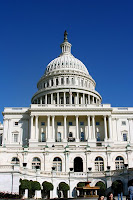 Health Reform Cheat Sheet
Health Reform Cheat SheetThe House of Representative’s version of health-care reform will cost more than the $894 bn 10-year price tag cited by the Congressional Budget Office.-
That’s because the CBO and Congress do not address human responses to legislation. Tax something more, you ultimately take in less in taxes. Penalize a company, and it finds ways to dodge the penalty.-
And lawmakers have put in this unintended consequence: The individual premium costs in public option to take care of the poor are actually higher than other offerings.-
That’s right, the CBO says the public plan’s premiums are higher than the premiums in the public exchanges, undermining the House’s claim that it will attract 9 mn enrollees by 2019 and result in a two-thirds decrease in the number of uninsured adults in the U.S.-
Use the following as a cheat sheet in coming days as the health-care reform bill wends its way through Congress. The cheat sheet provides an X-ray to this impenetrably dense bill and the CBO’s scoring. The unintended consequences from this bill will be manifold.-
You’ll see the CBO is struggling mightily to score these legislative phantasms, noting its work is not done and that its estimates are “subject to substantial uncertainty.”-
Watch for Congressional statements that, while technically accurate, will also keep you barefoot and clueless on health reform, as the layers upon layers of provisions make the reform bill as transparent as a bucket of tar. And which means the resulting deficit spending from this bill will only add to a U.S. debt load now big enough to block out the sun.-
Keep this in mind when you see the tax revenue the CBO and Congress claim the bill will raise to cover the costs. Both the CBO and Congress tend to not take into account the fact that individuals and companies reorganize their lives to avoid paying taxes.--
Health-care tax, or penalties, or whatever they call it will just mean people will carry on avoidance schemes, which means less revenues. Tax the rich, they’ll shelter it. Tax the Cadillac health insurance plans, insurers won’t offer them.-
Because the CBO and Congress generally do not take into account human behavior when scoring a bill (they use what’s called the “static,” not the “dynamic,” scoring model), the revenue estimates from the CBO and Congress on past tax legislation have been off by a factor of $150 bn or more.-
Also, the reform bill’s taxes are not indexed to inflation, so as more middle-class pay rises into those brackets, more middle- class people will be hurt.-
Here are the details:-
The New Spending-
It includes $1.1 tn in new spending over 10 years: $425 bn increases to Medicaid and SCHIP; $605 bn on subsidies for the poor to buy insurance; $57 bn in spending on primary care increases; and $34 bn in new spending on public health initiatives.-
The New Costs-
The bill’s costs are offset by a new tax surcharge on high-income individuals and other provisions estimated to increase federal revenues by $572 bn; and $168 bn in collections of penalties paid by individuals if they don't buy insurance ($33 bn estimated) and employers ($135 bn) if they don’t buy health insurance for their workers.-
To pay for the bill, the House is also counting on other undefined spending changes. That includes fee cuts for nonphysicians, meaning other health care providers, of $229 bn, and Medicare Advantage cuts of $170 bn ($245 bn in Medicare cuts to doctors over ten years has since been nixed; that cost is now moving into other government budget line items). It’s also counting on wringing tens of billions of dollars in waste and fraud out of the system to pay for the bill.-
The Reality Check That Bounced-
Ok, think this through. Higher taxes on the rich have historially not delivered the revenues promised because the rich shelter their income, IRS data show.-
And the pool of taxpayers that would supposedly toss off all this tax revenue is not that vast and deep--the 5.4% surtax on singles earnings $500,000 in the house bill, married couples earning $1 mn--is only 494,967, based on 2007 IRS data, the last year for which data is available, notes William Ahern of the Tax Foundation.-
Tax cuts can deliver revenues -- the Clinton tax cuts on estates and capital gains delivered more revenues than promised tax revenues from the tax hikes on the rich, according to IRS data.-
And do you really believe that future Congresses over the next 10 years will hang tough and make the $399 bn in total reimbursement cuts to hospitals, other providers, and Medicare Advantage, each year for 10 years straight?-
Remember, the 1997 Balanced Budget Act tried to chase down this exact strategy, but Congress undid those cuts and reimbursed providers anyway.-
And watch out for the promises to cut waste and fraud out of the system that the House is counting on from the American Medical Association and hospitals.-
You really think the AMA can corral the 135,000 active doctors in its membership to deliver on these promises? Or that the nation’s 5,700 hospitals will all fall in line?-
How Employers Will React-
The “play-or-pay” requirement on employers says they would either have to offer “qualifying” insurance to their employees and contribute a substantial share toward the premiums, or pay a fee to the federal government that would generally equal 8% of their payroll.-
It’s an easy choice for employers: Lay off and not hire workers if the insurance costs are too high, or just pay the extra 8% payroll tax and dump workers on the public plan. Which means more costs to the U.S. taxpayer.-
State Taxes May Rise-
Moreover, the federal funding for Medicaid to take care of extra enrollees will only cover 70% of the state’s costs. The rest the states have to pay for. That means state taxes rise.-
Public Option’s Not So Cheap Premiums-
The primary rationale espoused by Democrats for the government-run health care plan is that it would drive down costs by providing a lower cost option than private plans (and thus force the greedy insurance companies to lower their “exorbitant” rates to compete), notes Fox News analyst James Farrell.-
But will the poor really sign up for the public option since its premiums are higher than the average private industry plan in the new proposed insurance exchanges? How would the public option drive down insurance costs through competition if its premiums are higher than the average private industry plan in the exchanges?-
The CBO finds that under the House plan, the government-run plan would actually charge higher premiums:-
"That estimate of enrollment reflects CBO’s assessment that a public plan paying negotiated rates would attract a broad network of providers but would typically have premiums that are somewhat higher than the average premiums for the private plans in the exchanges."-
The Opt Out is Not an Option-
Democratic Senate Majority Leader Harry Reid announced the health-care bill will have a public option and a way for states to opt out of the public option (the House bill does not include an opt-out ).-
It’s a charade — taxpayers in states that opt out will get taxed anyway to pay for the bill. And who in each state gets to decide to trigger the opt out escape hatch? Voters? State legislators? -
The DMV?-
A churlish reaction would be this: couldn't the states turn around and say they want to opt out of the fed’s unfunded mandates —like the expansion of Medicaid to pay for the health reform bill, where they’ll have to pony up 30%?-
The Arizona Legislature already passed the Health Care Freedom Act, which places an initiative on the 2010 ballot allowing citizens to vote to decide whether the state should opt out of the entire health care reform bill, notes Darrell M. West, vice president and director of governance studies at the Brookings Institution. Other states are considering similar legislation, West says.-
And West wonders if unhealthy people will migrate to states with a public option if their own jurisdiction opts out of the national system. States may be tempted to establish residency requirements for health care the way they did for welfare, he says, possibly making it more difficult for the uninsured to get coverage in those areas.-
Also, if states don’t like congressional decisions on gun control, climate change or immigration, will state legislators demand an opt-out? “If this were 1965 and there were a Medicare opt-out, it is conceivable we would have ended up with two-thirds of the country having Medicare, while one-third did not,” West says.-

















